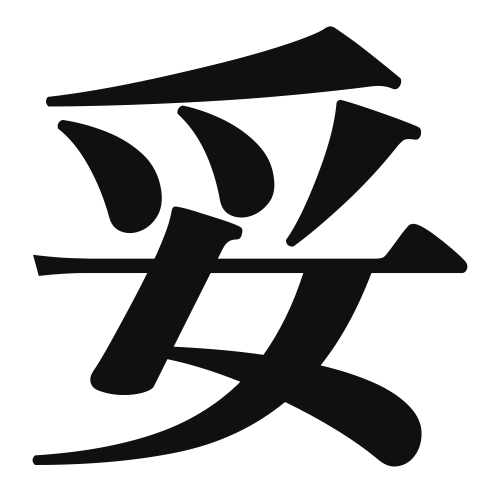1. Overview of Meaning
The kanji “妥” (da) generally means “appropriate,” “suitable,” or “acceptable.” It conveys a sense of being reasonable or fitting in a given context.
2. Formation and Radical
Formation of the Kanji: The kanji “妥” is a phonetic-ideographic character (形声文字). It combines the radical for “woman” (女) on the left, which often relates to femininity or nurturing, and the phonetic component “da” (妥) on the right, which contributes to its pronunciation.
Radical: The radical of “妥” is 女 (woman), indicating a connection to themes of care, nurturing, or relationships.
3. Examples of Usage
Common Words and Phrases:
- 妥協 (だきょう, dakyou) – compromise
- 妥当 (だとう, datou) – appropriate, valid
Example Sentences in Daily Conversation:
- この提案は妥当だと思います。 (I think this proposal is appropriate.)
- 私たちは妥協する必要があります。 (We need to reach a compromise.)
4. Synonyms and Antonyms
Similar Kanji:
- 適 (てき, teki) – suitable; while both “妥” and “適” convey a sense of appropriateness, “適” often emphasizes suitability in a broader context.
- 合 (ごう, gou) – to fit; this kanji focuses more on the idea of fitting together rather than being appropriate.
Antonyms:
- 不適 (ふてき, futeki) – unsuitable; this term directly opposes the meaning of “妥.”
- 無理 (むり, muri) – unreasonable; indicating something that is not appropriate or feasible.
5. Cultural and Historical Background
Connection to Japanese Culture: The concept of “妥” is often reflected in Japanese culture, where harmony and appropriateness in social interactions are highly valued. The idea of compromise (妥協) is essential in maintaining relationships.
Proverbs and Idioms:
- 妥協は時に必要だ (Compromise is sometimes necessary) – highlighting the importance of finding a middle ground in conflicts.
